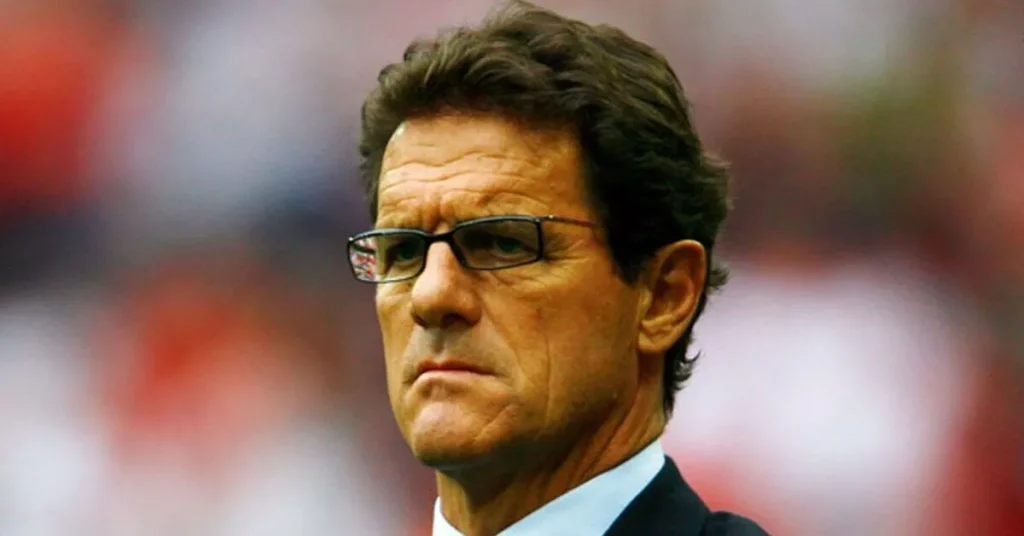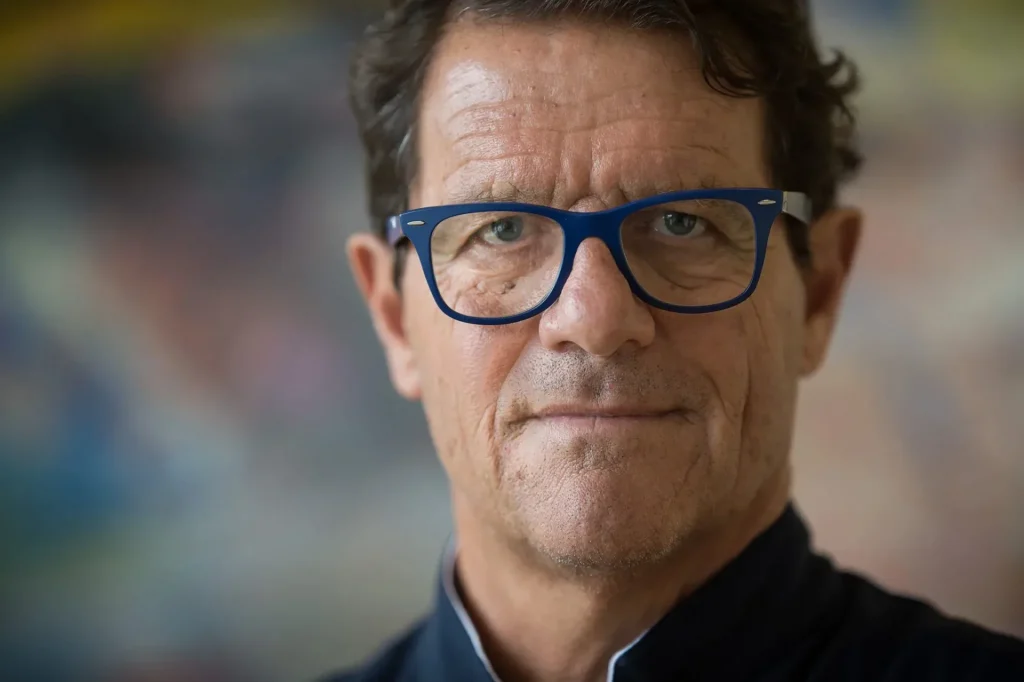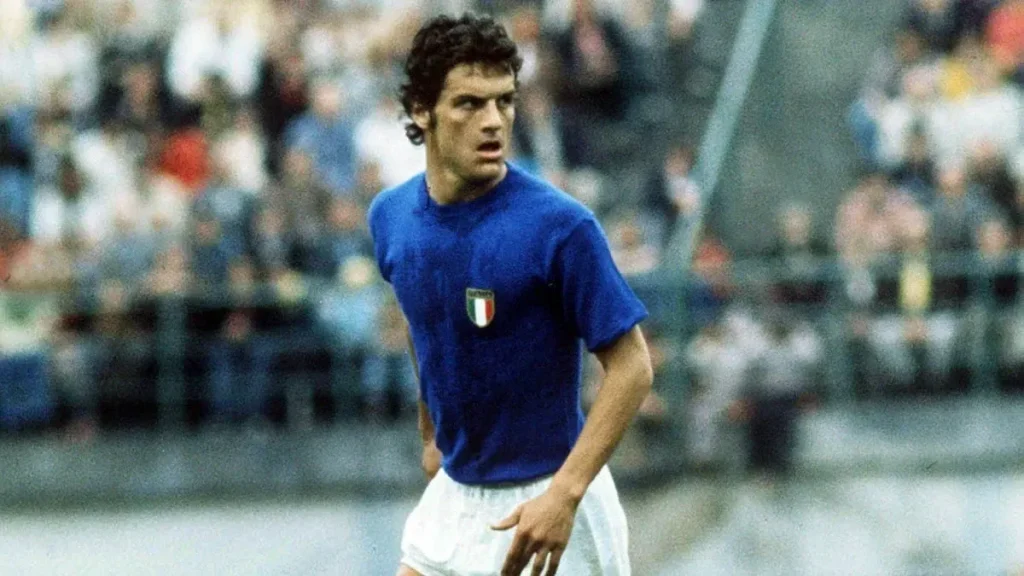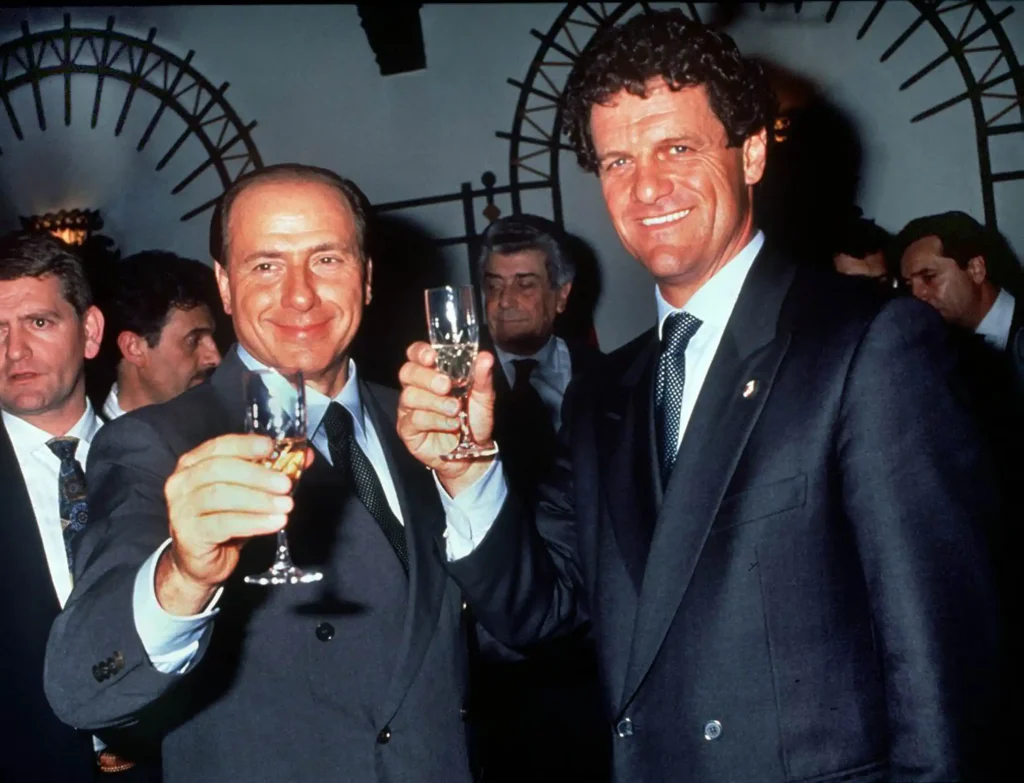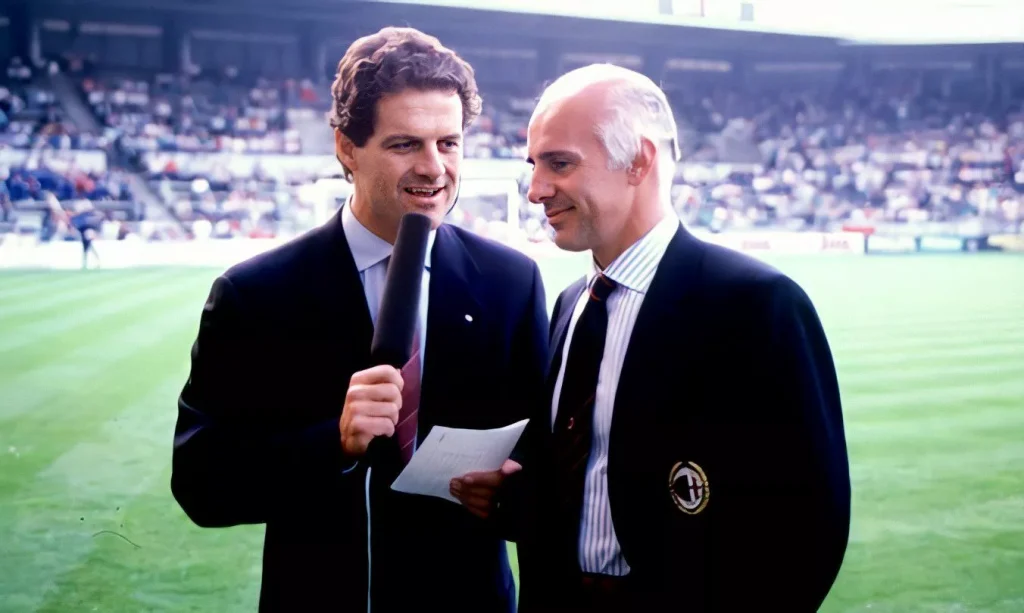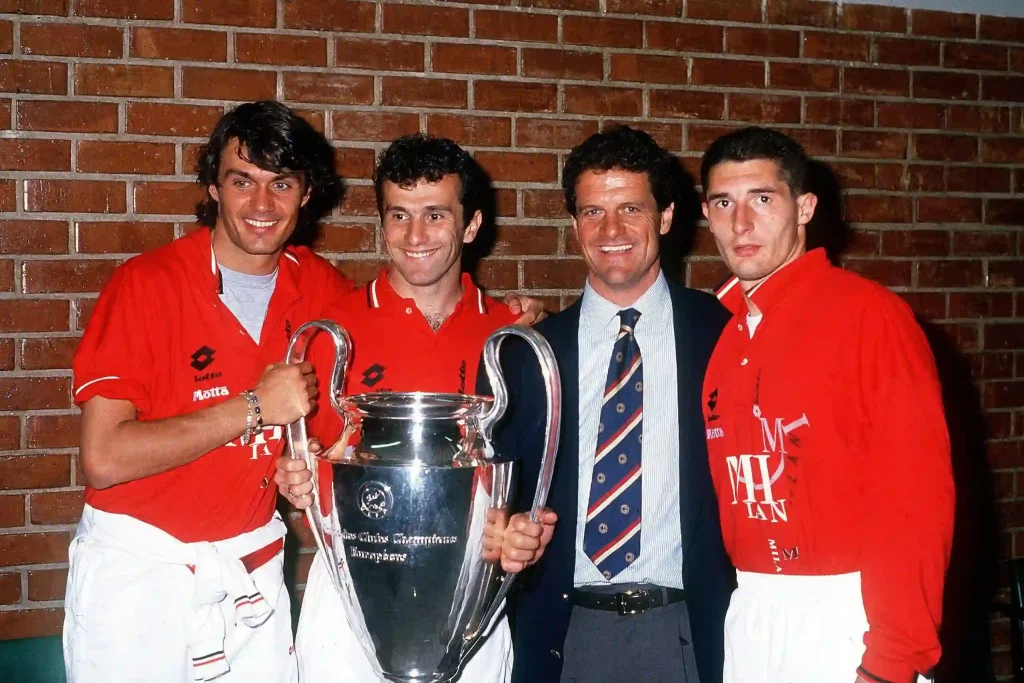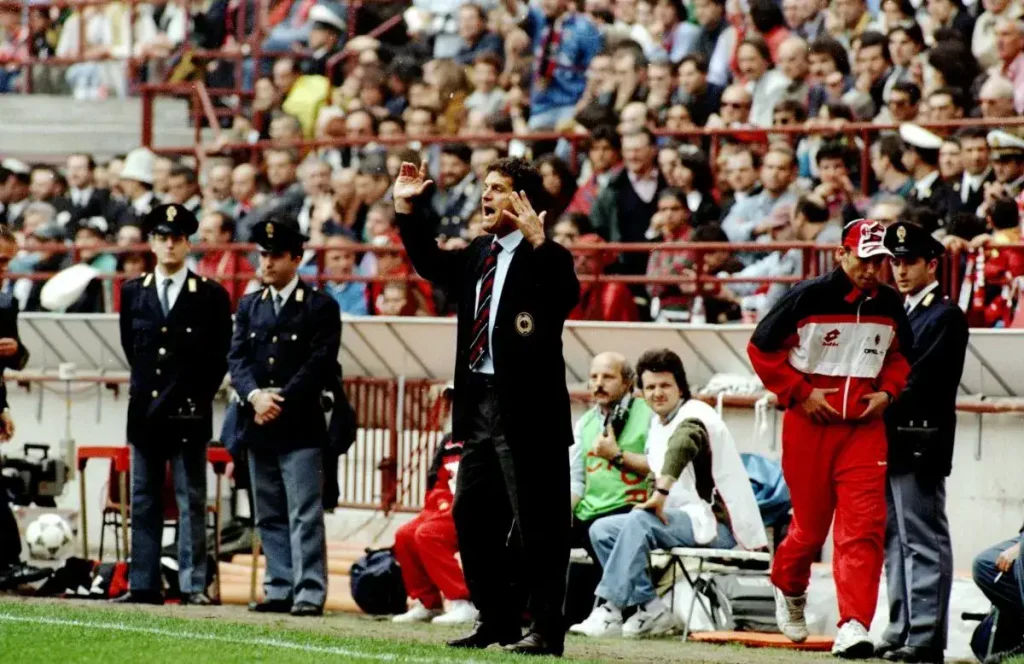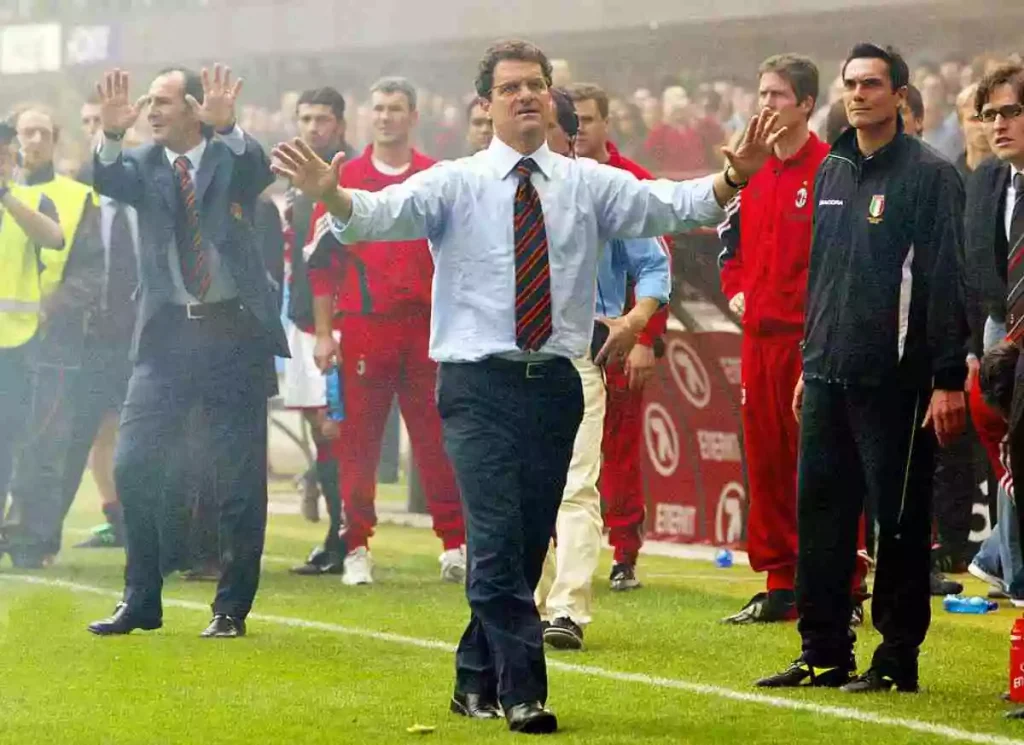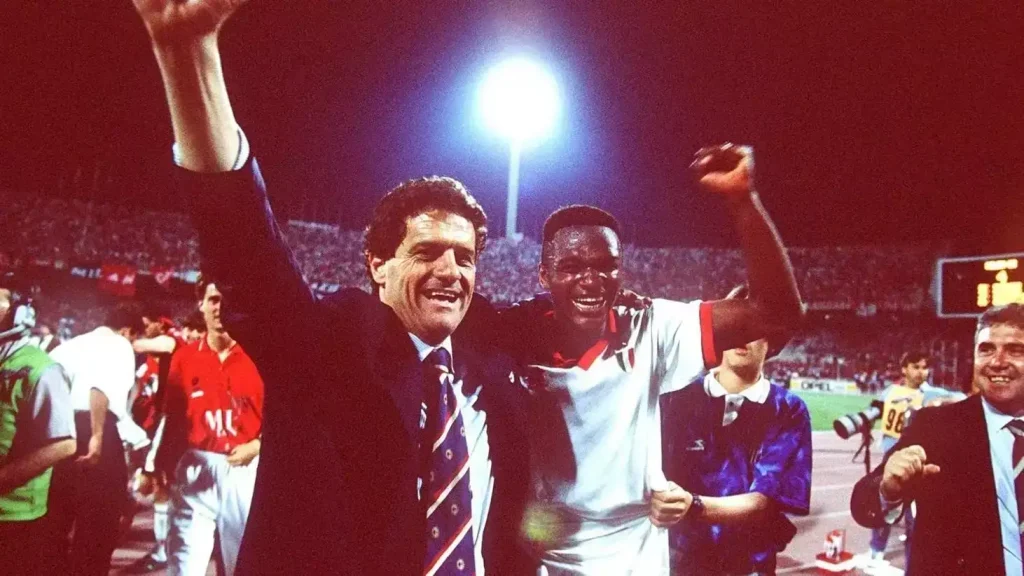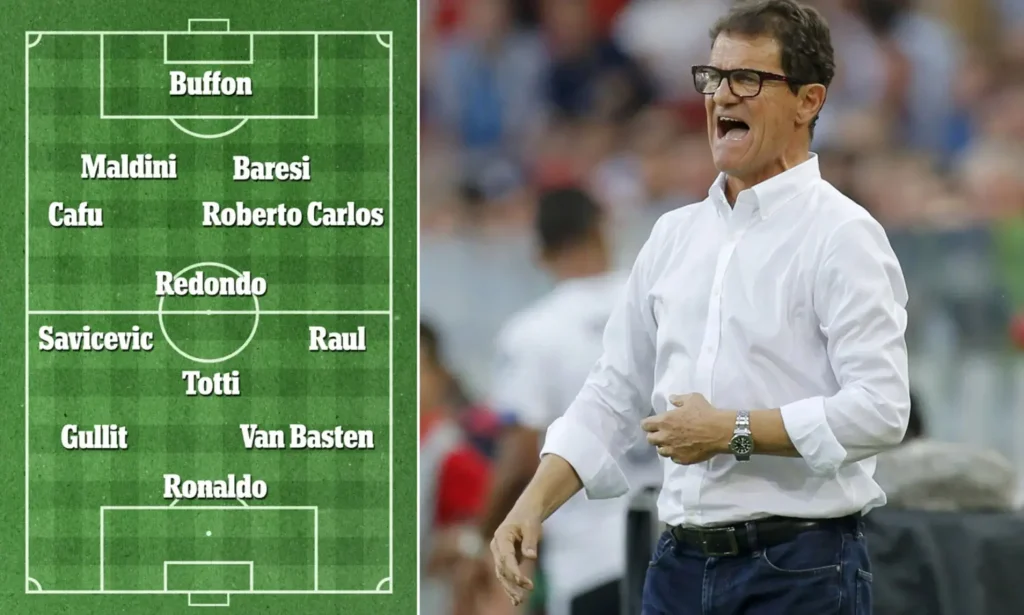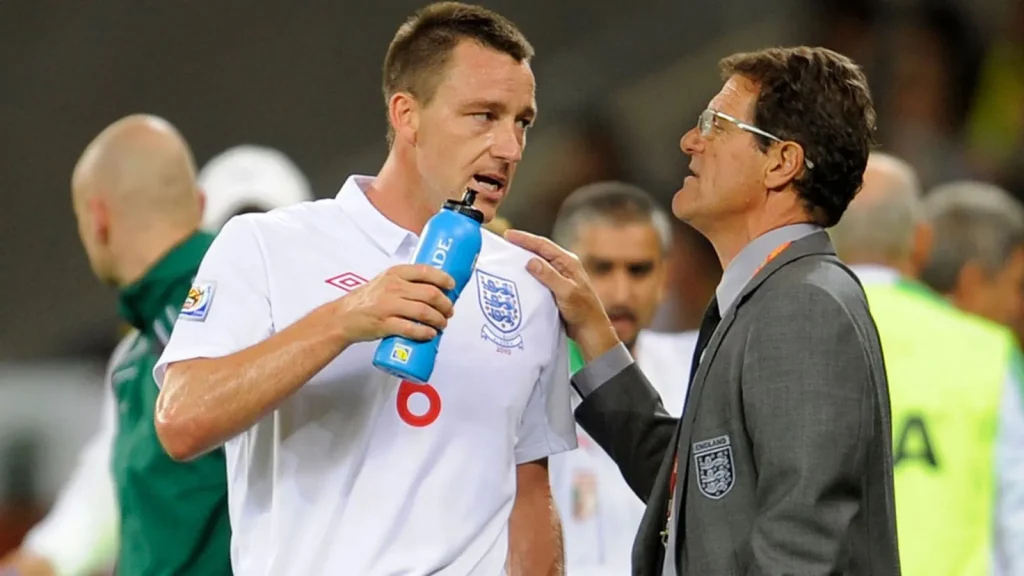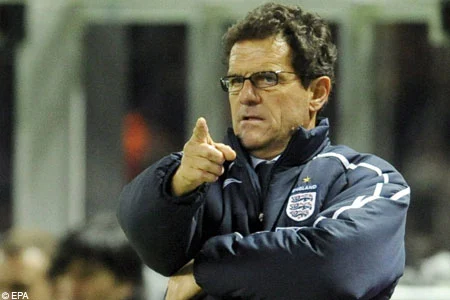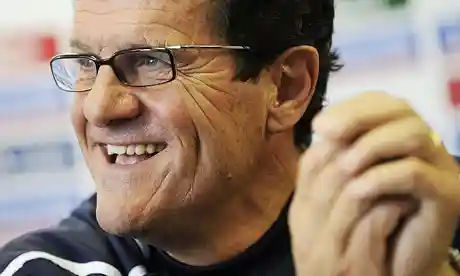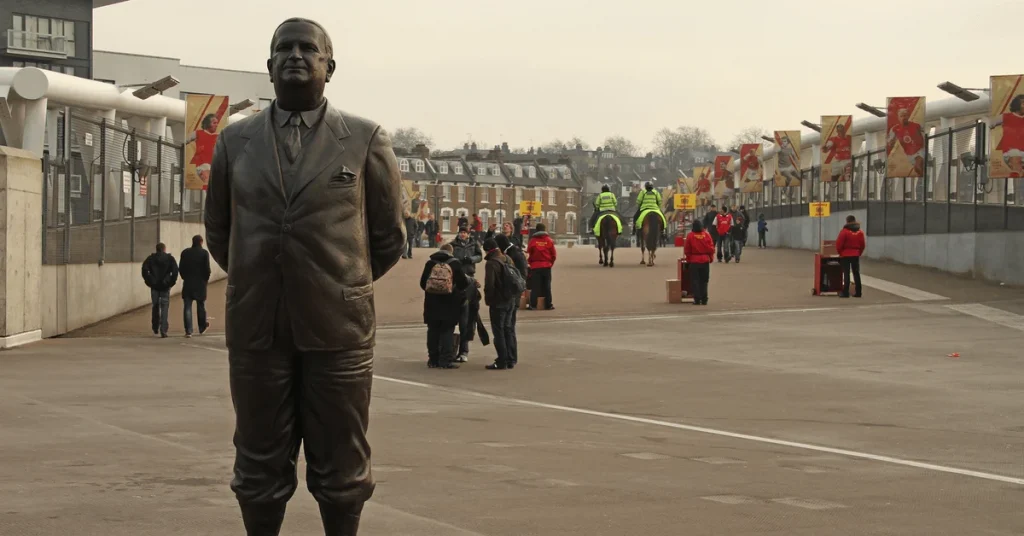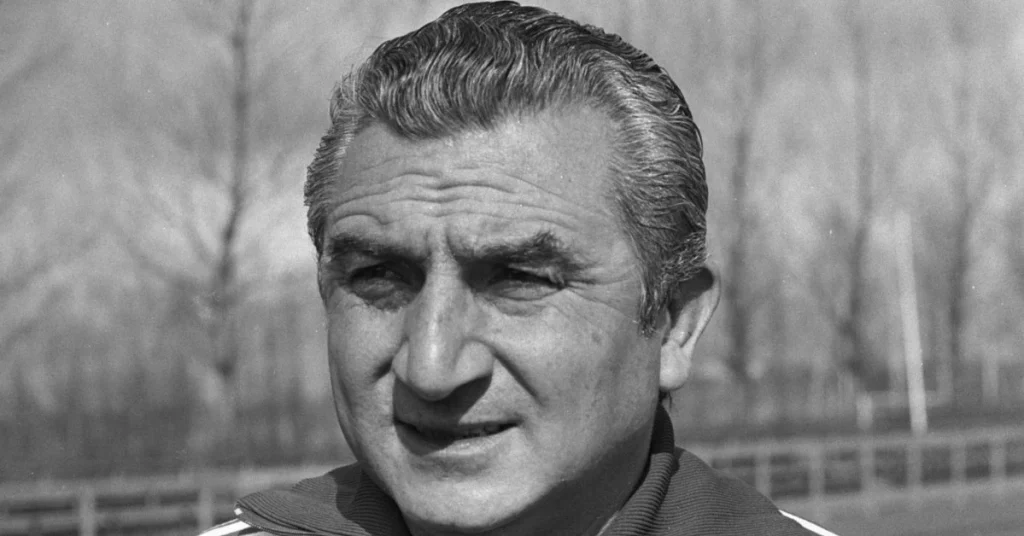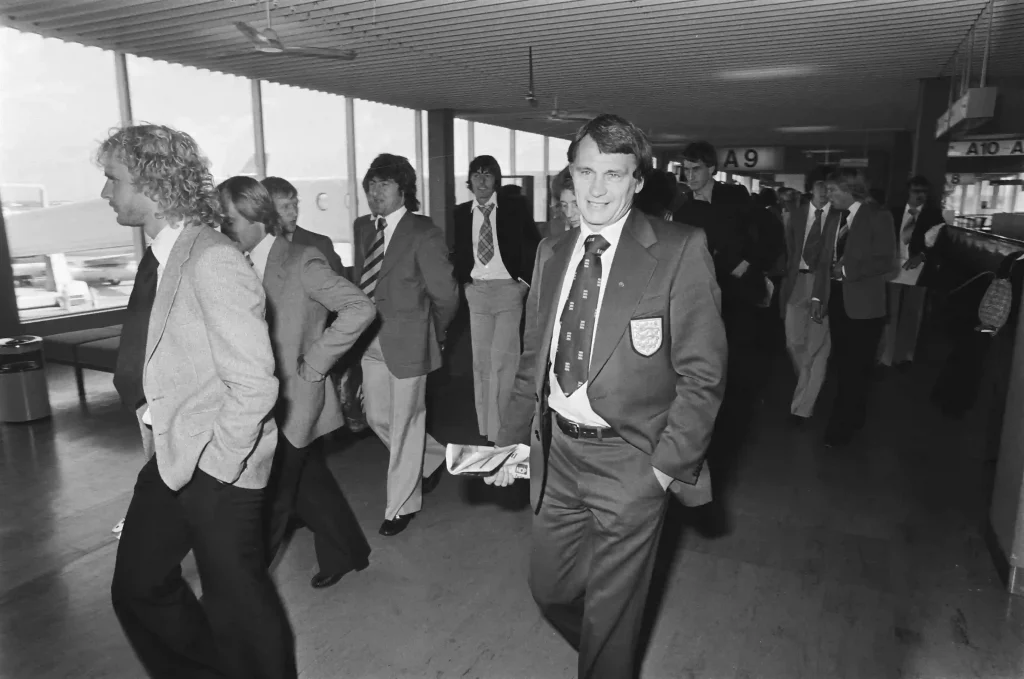Fabio Capello has had many labels throughout his prodigious managerial career. A pragmatist, a tactician, and a fierce disciplinarian with clarity of mind and an obstinate determination to succeed.
He was, however, no yes-man and indeed no proxy for Silvio Berlusconi, AC Milan’s omnipotent president. The latter, in 1991, entrusted the rookie Italian coach to take the reins at the Milanese giants.
Becoming AC Milan Manager
Upon taking control of AC Milan, the Italian press envisaged Fabio Capello as Berlusconi’s obsequious leader. He was, in fact, the antithesis.
A stubborn man who would allegedly engage in stand-up rows with his players in front of the whole team was equally unamenable to ‘Il Presidente.’ The two may have discussed formations or debated the inclusion of the precociously talented yet somewhat workshy Dejan Savićević.
Still, Fabio Capello ultimately decided which system Milan employed and the personnel filling those positions. Capello was a ‘Mister’ who commanded respect.
Fabio Capello Trophies As Manager Of AC Milan
Above all, however, during his five-year tenure at the San Siro between 1991 to 1996, Capello’s Milan were:
- Serial winners
- Bringing home four Serie A titles
- One European Cup
- One European Super Cup
- Two Italian Super Cups
An unbeaten record stretched to 58 Serie A games between 1991 and 1993
Together, Fabio Capello and his players achieved what many thought impossible: building and even improving upon the club’s pioneering success orchestrated by the fabled Arrigo Sacchi. Under Capello, the Milanisti saw their team etch themselves further into Red and Black folklore.
Under Capello, AC Milan became Gli Invincibili (The Invincibles).
“At Milan, there’s always hope and expectation, and everyone works with a great sense of aiming to be the best.” Fabio Capello
Replacing The Great Manager
When new manager Capello stepped in to replace Sacchi, AC Milan was arguably already the best team on the continent. Though the Diavolo had failed to win anything during Sacchi’s last season in charge, the previous three years had brought back-to-back European Cup successes, and the club’s first Scudetto in nine years wrestled from Diego Maradona’s Napoli during the 1987-88 campaign.
But Sacchi’s achievements at the San Siro transcended the silverware sitting in Casa Milan’s ostentatious trophy room. The coach revolutionized the way Milan – and for that matter, many Italian clubs – played the game. Out with Nereo Rocco’s Catenaccio and in with a new era of Total Football.
Man-marking was abandoned, and a strikingly high defensive line allowed Sacchi to employ an integrated pressing system. This tactic continues to resonate in Pep Guardiola’s Counter Press and the Gegenpressing of Jürgen Klopp.
In addition, Sacchi’s famed doctrine of universalism was grounded in the idea that players should equip themselves with the skill-set to play in many different positions and be comfortable doing so, facilitating a fluidity to the Rossoneri’s play.
Moreover, Sacchi combined his tactical ingenuity with the ability to forge the right blend of players who “spoke the same language.”
The dependable defensive quartet of Mauro Tassotti, Franco Baresi, Alessandro Costacurta, and Paolo Maldini was the perfect foil to the bewitching Dutch triumvirate of Marco van Basten, Frank Rijkaard, and Ruud Gullit. As a result, Sacchi’s Milan became a cult team. A team for the hipsters.
“Wherever you go, you have to be convinced about your vision of soccer. The players you have must be carefully analyzed, and you must know how to bring out the best in them. How do you do that? To find a style of playing and a system in which players can perform at their best.” Fabio Capello
Learning From Other Sports
While Sacchi was busy altering Calcio’s landscape, Fabio Capello took a hiatus from soccer but not from Milan. Incredibly, he dabbled in management of the club’s baseball, ice hockey, volleyball, and rugby sections.
However, when Sacchi fell out with van Basten in 1991 and delivered Berlusconi the “It’s van Basten or me” ultimatum, Capello was awarded his first full-time coaching role.
Despite inheriting a talented squad, the new manager’s chances of maintaining his predecessor’s level of success were considered improbable. The prevailing view reinforced this belief that Sacchi’s grueling training methods had taken their toll on the players.
The squad was moribund. At least, that is what people thought.
Adding His DNA
In his seminal work on the history of soccer tactics, Inverting the Pyramid, Jonathan Wilson notes that Sacchi himself believed this to be accurate after the tactician admitted: “I thought they were a great side near to their sunset boulevard, reaching the end of an unrepeatable cycle of success.”
Perhaps he should have known better. After all, the manager had laid the foundations for Milan’s subsequent success.
It must be acknowledged that while Fabio Capello was inexperienced in terms of his years leading from the sidelines, his spells with Milan, both as a key player and a coach at the youth and assistant level, ensured that the club was part of his DNA.
Indeed, while assistant to Nils Liedholm during the 1986/87 season, Capello had even briefly taken the helm after the Swedish coach resigned with six games remaining. This experience was vital to Capello’s immediate success.
Fabio Capello Gaining Respect
Unlike other novices in his position, Fabio Capello already commanded the respect of some of the Rossoneri’s key figures.
The new manager had coached Paolo Maldini at the youth level. In addition, he played with Franco Baresi towards the back end of his career, during which the latter had already seen enough to convince him of Capello’s aptitude for management.
“He was already a coach on the pitch,” Franco Baresi noted while speaking on Sky Sport’s series, Football’s Greatest.
More importantly, Fabio Capello was intelligent enough to resist the temptation to implement sweeping reforms when he first arrived at Milanello. Sportswriter and Italian soccer expert Paolo Bandini summarised this seamless transition as “much more a case of evolution than a revolution.”
Sacchi’s 4-4-2 formation remained, and so did most of the personnel. However, there were slight tweaks, including the signing of goalkeeper Sebastiano Rossi, the promotion of a 20-year-old Demetrio Albertini ahead of veteran Carlo Ancelotti in central midfield, and the conversion of Daniele Massaro from midfield to attack.
Play With Freedom
Meanwhile, Fabio Capello’s coaching ethic focused more on the individual than Sacchi, allowing his players more freedom, especially in the forward areas.
“Perfection in football does not exist, but we came pretty close this season.” Marco van Basten
The subtle alterations worked to devastating effect. In Fabio Capello’s debut season, AC Milan won the 1991/92 Scudetto and went unbeaten, winning 22 and drawing 12 in Serie A.
Contrary to the view that Capello was, from the outset, more defense-minded than his predecessor, the Diavolo scored 74 goals and produced some memorable exhibitions of attacking soccer, beating Lazio 6-3, scoring five past both Napoli and Sampdoria, as well as destroying Zdeněk Zeman’s Foggia 8-2 on the last day of the season.
Inspiring Marco Van Basten
Capello’s Midas touch also reinvigorated Marco van Basten, who finished the season as Serie A’s top scorer with 25 goals. The Dutchman’s form vindicated Berlusconi’s decision to prioritize his prized striking asset and underlined the importance of keeping him at AC Milan.
But, of course, it is hard to know how much credit manager Capello should or shouldn’t be awarded for Van Basten’s form.
The Ajax former professional had hit 19 goals in a Serie A season twice under Sacchi. Nevertheless, individual flair is part of the Dutch soccer psyche, and Fabio Capello’s willingness to tailor his approach helped liberate the likes of Marco Van Basten from the collective constraints of Sacchi’s system.
This harnessed the individual goalscoring brilliance of the three-time Ballon d’Or winner.
Buttressed by this ground-breaking first season, the manager Capello spent heavily in the consequent transfer window.
He recruited a host of star names, including Marseille forward Jean-Pierre Papin, Dinamo Zagreb icon Zvonomir Boban, Torino’s sought-after Italian midfield prospect, Gianluigi Lentini, and the star of the Red Star Belgrade’s European Cup-winning side, Dejan Savićević.
This wealth of options gave Diavolo’s coach something of a headache when selecting personnel, and restricted by Uefa’s three foreigners rule, Savićević was often used sparingly on account of his propensity for laziness.
Fabio Capello had no time for superstars who shirked the game’s industrious, less glamorous side.
Fabio Capello And Berlusconi Relationship
While the manager and Berlusconi often locked horns over the Montenegrin’s non-inclusion, Milan continued to dominate domestically. They retained the title with a game to spare, finishing four points above city rivals Internazionale.
As with the previous campaign, Capello’s men at times proved irresistible, beating Fiorentina 7-3 at the Stadio Artemi Franchi and putting five past Pescara, Lazio, and Napoli.
However, unlike their debut season, Fabio Capello’s Milan did show signs of vulnerability. On 21 March 1993, Parma ended Rossoneri’s 58-game unbeaten run in Serie A with a 1-0 victory at the San Siro.
It took a superb Faustino Asprilla free-kick to finally stun the Milanisti into silence. Gli Invicibili were suddenly mortals.
End Of An Era
Two months later, this vulnerability was exposed in more painful circumstances against Marseille after the French champions snatched a 1-0 victory in the European Cup final in Munich. The defeat represented a symbolic end to Milan’s Dutch romance more poignantly.
Having seen his role under Fabio Capello become increasingly peripheral, Ruud Gullit had been omitted from the squad. This would pave the way for his subsequent departure to Sampdoria. Rijkaard played but also moved on after the final, returning to Ajax.
As for van Basten, his worsening ankle condition severely hindered his performances, and though he played that night in Munich, he was not match fit.
Hindsight is a beautiful thing, and there are few coaches throughout the annals of soccer history who would have been bold enough to drop a key player of such caliber. However, as Paolo Bandini mooted, might things have gone differently had Fabio Capello accepted that Van Basten wasn’t good to go and adjusted his team accordingly?
If the coach Capello epoch possessed a great regret, the defeat against Marseille and how things ended for the Dutchman wouldn’t come far off.
As it was, van Basten’s injury sidelined him for the entirety of the 1993-94 season and ended his magisterial career in 1995. That night in Munich represented the end of an era for AC Milan.
“My idea of football doesn’t change with time; it evolves according to the players I’ve got.” Fabio Capello
The absence of Milan’s Dutch trio forced manager Capello into a tactical rethink. Out with swashbuckling attacking soccer and in with pragmatic, defensive fortitude. So while the 4-4-2 set-up ostensibly remained, the Rossoneri boss tweaked things again.
Fabio Capello Tactics
Christian Panucci was brought in to reinforce a back four still led by the steadfast pairing of Baresi and Costacurta. At the same time, Marcel Desailly arrived to replace Rijkaard in the center of midfield.
This heralded the creation of a specialized position for which Capello would later become renowned; the holding player who sits at the base of the midfield and shields the back four.
Ironically, the Ghanaian-born Frenchman had been inadvertently scouted by Milan’s former sporting director, Ariedo Braida, who had traveled to Marseille to watch future Lazio forward, Alen Bokšić.
However, Marcel Desailly impressed, and upon arriving at Milanello, the newly-converted defensive midfielder became an integral piece to Capello’s newly configured puzzle.
As Jonathan Wilson notes, adopting such a specific role for an individual player was anathema to Sacchi’s universalism.
This tactical adjustment symbolized the shift from the attack-minded football of Sacchi and Fabio Capello’s early years to a conservative system that revolved around bolting the back door shut and snatching a goal at the other end. After all, manager Capello had always been an admirer of Nereo Rocco.
Consequently, Capello’s 4-4-2 system was often played in a 4-1-4-1 configuration, with Desailly occupying the base of the midfield and one of Milan’s two attacking players from Massaro, Marco Simone, Brian Laudrup, Papin, and Savićević dropping deeper to compress the midfield.
It may not have been aesthetically pleasing, but it was undoubtedly effective. AC Milan conceded just 15 goals in 34 league games as they won a third straight Serie A title, keeping a staggering 21 clean sheets along the way.
But such stern defense was detrimental to their formerly free-flowing attack, exemplified by the meager 36 goals mustered throughout the campaign. Indeed, throughout the 1993/94 season, 1-0 became the scoreline of choice for Fabio Capello’s men, winning by that margin nine times.
Not Many Goals
Irked at his lack of goalscoring opportunities and regular playing time, Jean Pierre-Papin humorously captured the banality of working within the confines of such a modus operandi when he bemoaned: “If Capello’s system looks boring from the stands, it’s even worse to play in.” But Fabio Capello remained unperturbed, and at this point in his coaching career, his pragmatic streak truly revealed itself.
“The most important thing is results,” Fabio Capello once told the History Of Soccer lead writer. “That’s not philosophy. It’s a fact.” While this outlook would undoubtedly have been considered unpalatable by Capello’s opposite number in the 1994 European Cup final, Johan Cruyff’s Barcelona side would soon discover their opponents had not forgotten the mores of Total Football.
With Baresi and Costacurta missing the final through suspension, many felt the Italian’s stood little chance against a Barcelona team that boasted the attacking flair of players like Romário and Hristo Stoichkov. Indeed, the reputation of Cruyff’s Barcelona was such that they had earned the rubric, ‘The Dream Team.
Writing Fabio Capello Off
In the build-up to the game, the Dutch coach had all but written Milan off, haughtily criticizing their “boring” and “defensive” style. However, Capello’s men produced a performance that was completely out of keeping with their season, dismantling Barcelona 4-0.
That night in Athens, the roles were reversed. The Catalan giants were suffocated by AC Milan’s high press and unhinged by their incisive passing. Savićević, in particular, starred, creating Massaro and Milan’s first and scoring a nonchalant lobbed volley for his side’s third. It remains one of the European Cup’s iconic strikes.
Perhaps as commendably, Fabio Capello had managed to convince his number 10 to combine his guile as a fantasist with the altruistic work the Italian demanded of his forwards. Indeed, it was Savićević’s willingness to chase down a lost cause that allowed him to win the ball high up the pitch and score his memorable goal.
The manner of the victory was a testament to the creed of Capello and his Milan side. Finally, after three years, they had their hands on the European trophy they so richly deserved.
“I can’t stand the crap that gets talked by everyone – players, fans, the media, club officials. Why should I waste my time listening to people who are less intelligent than me?” Fabio Capello
Resurgence Of Juventus
AC Milan’s domestic dominance was brought to a grinding halt by the resurgence of Juventus during the 1994-95 season. Having undergone a renaissance under Marcello Lippi, the Old Lady of Italian soccer swept aside and ended a nine-year baron spell without Lo Scudetto.
They finished 10 points above their nearest rivals Lazio, and like the Milan of Capello’s debut season, Juve’s balance of uncompromising defense and devastating attack proved a potent cocktail.
Indeed, that Lippi managed to combine an attacking trident of Alessandro Del Piero, Gianluca Vialli and Fabrizio Ravanelli was proof of the tactical balance and quality of this particular Bianconeri side.
Milan, meanwhile, finished a disappointing Serie A campaign in fourth place. This was compounded by another agonizing defeat in a European Cup final against Louis van Gaal’s talented Ajax side.
Fabio Capello Knowing His Worth
It was perhaps inevitable that the Rossoneri would eventually plateau following a prosperous first three years under Fabio Capello. However, Capello’s mulish character ensured he was not willing to sign out with the taste of defeat.
“I felt Milan didn’t value me as much as they should have after four good years and all the trophies we had won,” Capello told Football’s Greatest years later. “So I said, well, I will win the championship again, and then I’ll leave.”
Fabio Capello was under no illusions that his side needed to match Juve’s firepower going forward to achieve such a feat. Still able to call on Berlusconi’s riches, Milan recruited two veritable superstars in Roberto Baggio and George Weah.
The duo bolstered the existing options of Paolo Di Canio and Marco Simone. With the creativity of Savićević, Boban, Albertini, and Roberto Donadoni behind them, the Diavolo now had the firepower to reconquer the Scudetto.
Becoming More Experimental
AC Milan’s Mister did not abandon his pragmatic preoccupation with defensive focus but became more experimental with his tactics. The 4-4-2 formation remained a leitmotif, with Baggio and Weah leading the line. However, Fabio Capello also sampled a Christmas Tree shape, with the Liberian as the lone striker, or Prima Punta.
This allowed the playmaking capabilities of both Baggio and Savićević to be maximized, the latter for whom manager Capello increasingly accommodated, playing him either off the left or as a trequartista behind Weah.
AC Milan won the 1995/96 Serie A title at a canter, finishing eight points clear of Juventus. But, much like Capello’s first entire season at the club, his side signed off in style, demolishing the already relegated Cremonese 7-1.
Having brought success back to the San Siro, Fabio Capello sensed it was time for a new challenge, moving to another colossus of the European game, Real Madrid.
High Level Of Focus
In truth, it was a prudent move. The incredibly high level of focus and intensity expended to keep winning year after year had taken its toll. Milan had finally reached the end of an unparalleled cycle of success.
Burnt out, they finished a dismal 10th the following season, after which both Baresi and Tassotti retired to truly rubber stamp the end of a glorious era.
Though coach Capello returned to Milan for the 1997/98 campaign, the reunion quickly substantiated the old adage that one should never attempt to rekindle past romances. As a result, the Diavolo finished 10th once again, and despite his previous achievements at the club, Fabio Capello was sacked.
“Technically, we were better than anyone else, but also mentally, and that’s important. Everyone thinks you win games with your feet. No, you win games with your head.” Fabio Capello
Italy Soccer Ruled The World
Capello’s Milan succeeded during a time when Calcio ruled the world. It was an era during which Italian soccer produced not just one, two, or three footballing powerhouses but seven powerful sisters: Juventus, Inter, Roma, Lazio, Napoli, Fiorentina, Parma, and of course, AC Milan.
That they were able to win four Scudetti, one European Cup, and reach three successive European Cup finals in five years is measure enough of the grandeur of this team.
Fabio Capello himself deserves plaudits for inspiring an already successful group of players to scale even greater heights. The manager later made the required tactical and personnel adjustments to guarantee continued success, whatever the means.
And, of course, Capello’s side will always be remembered for their sumptuous players – from Gullit, Van Basten, Rijkaard, Savićević, and Weah, to Baresi, Tasotti, Maldini, Desailly, and Albertini. But it is also essential to pay tribute to a man who has often played the pantomime villain: Silvio Berlusconi.
Silvio Berlusconi Was A Good Judge
The media tycoon was not only the side’s patron but also the brains behind two of the most critical managerial appointments in the history of the AC Milan football club. He hand-picked Sacchi and then entrusted Fabio Capello to continue the cycle. Despite their supposed inexperience, Berlusconi’s instincts were triumphantly vindicated.
Thus, while we are often quick to remember the revolutionary and enchanting soccer of Arrigo Sacchi, from a result’s perspective, Fabio Capello’s Milan was unquestionably more successful.
That is not to suggest that they should be celebrated above and beyond Sacchi’s side, nor should the results and philosophical dichotomy blur the greatness of either coach and their respective Milan teams.
Instead, we should celebrate both with equal measure and continue to appreciate the truly stunning achievements of AC Milan during the Football Italia years.
Fabio Capello Teams Coached
After his time at AC Milan, the manager spent a year at Real Madrid, where the coach won the La Liga title in his first entire season.
In 1996, Capello was announced as Real Madrid’s new coach. In 1997, he led Real to the Spanish La Liga league title during his one season in charge. It was just two points that separated Real Madrid from their bitter rivals Barcelona. Even though the manager was successful, he had a falling out with chairman Lorenzo Sanz because of his playing style.
In 2001, the coach led Roma to their first league title in 18 years. During his time at Juventus, manager Capello won two titles (later stripped after the Calciopoli scandal).
His second La Liga title came in 2006 when the manager returned to Real Madrid. The club won its 30th La Liga title under his guidance on the season’s final day. Once again, Capello was sacked despite winning La Liga only a season after Real Madrid welcomed ‘Don Fabio’ back.
Over the course of his 16 seasons as a manager, he has won a major league championship seven times (or nine, counting the two revoked titles with Juventus). Undoubtedly, he is one of the greatest managers in history.
International Management
In December 2007, Fabio Capello became the England national team manager.
His team qualified for the 2010 FIFA World Cup, where they lost in the second round, and the 2012 UEFA Euro Championships
After resigning as the England national team manager in February 2012 due to a dispute with the Football Association, he was appointed coach of the Russia season national team in July 2012.
The Russian Football Union sacked him in July 2015. The following year, he was sacked as the coach of the Chinese club Jiangsu Suning, after which he retired.
Fabio Capello England Manager
The country of England has always been a passion for Fabio Capello. A goal he scored at Wembley in 1973 gave Italy their first victory against England on English soil, making it the highlight of his career.
There is an odd reason for Capello’s association with that moment. He said Italian immigrants in England were treated as mere “waiters” for many years. It is also because he has a fascination for the way English football is played that Fabio Capello cherished leaving his mark at Wembley.
In his request to the Football Association (FA), he expressed his deep interest in the English game.
The appointment of Capello as England manager was formally announced on 14 December 2007. A four-and-a-half-year deal began in January 2008 when he started his day-to-day duties as England manager. According to reports, he earned £6 million per year.
Announcing his appointment as manager of the England national team, Capello said it was a dream come true. Fabio Capello successfully guided England’s World Cup qualifying campaign for the FIFA 2010 World Cup in South Africa. Unfortunately, the England manager could not take them past the round of 16 knockout stages after being defeated by Germany.
How Long Did Fabio Capello Manage England
Fabio Capello managed the England national football team from 2007 to 2012. During his time as the England national team manager, Fabio Capello had a record of 35 wins, ten draws, and eight losses. He led the team to Round 16 at the 2010 World Cup and the qualification rounds for the 2012 European Championship.
Fabio Capello left his position as manager of the England national team in February 2012 due to a disagreement with the Football Association (FA) over the decision to strip John Terry of the captaincy.
Capello believed that the FA should have waited until the outcome of Terry’s court case before making a decision, while the FA felt it was in the team’s best interests to remove him as captain. Capello resigned as a result of this disagreement.
Fabio Capello Stats, Facts, And Figures
Full Name: Fabio Capello
Birthdate: 18/06/1946
Birthplace: San Canzian d’Isonzo, Italy
Playing Career:
- SPAL 1964–1967
- Roma 1967–1970
- Juventus 1970–1976
- AC Milan 1976–1980
Total Appearances: 341 matches, 45 goals
Played Internationally:
- Italy National Team 1972–1976 (32 appearances, 8 goals)
Playing Honors:
SPAL
- 1964–65 Serie B champions
Roma
- 1968–69: Coppa Italia Winners
Juventus
- 1971–72, 1972–73, and 1974–75: Serie A Champions
AC Milan
- 1978–79: Serie A Champions
1976–77: Coppa Italia Winners
Managerial Career:
- 1982–1986: AC Milan
- 1991–1996: AC Milan
- 1996–1997: Real Madrid
- 1997–1998: AC Milan
- 1999–2004: Roma
- 2004–2006: Juventus
- 2006–2007: Real Madrid
- 2007–2012: England National Team
- 2012–2015: Russia
- 2017–2018: Jiangsu Suning
In April 2018, Fabio Capello officially announced that he had retired from soccer management/coaching.
Fabio Capello Trophies:
- 7 Italian Serie A Championships
- 2 Spanish La Liga Title Championships
- 4 Italian Supercoppa Italiana Cups
- 1 UEFA Champions League
- 1 European Super Cup
Coaching Statistics:
- 843 Games
- 459 Wins
- 241 Draws
- 143 Lost
- 1421 Goals For
- 714 Goals Against
- 54.45% Win Rate
Individual Honors:
- 1991–92, 1993–94, 1997, and 2000–01: Panchina d’Oro
- 1993–94: European Coach of the Season
- 1994: European Coach of the Year – Sepp Herberger Award
- 2005: Serie A Coach of the Year
- 2009: BBC Sports Personality of the Year Coach Award
- 2011: Marca Leyenda
- 2011: Gran Galà del Calcio Critics’ Award
- 2013: Italian Football Hall of Fame
- 2015: AC Milan Hall of Fame
